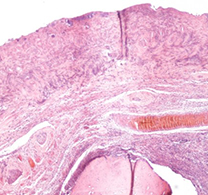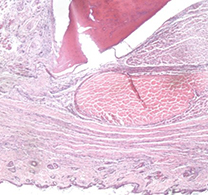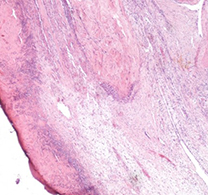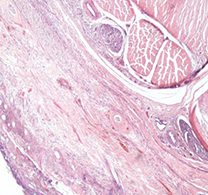Ongoing Research at Levin Lab
 Vascularized composite allotransplantation (VCA) consists of various tissue combinations, including muscle, nerve, tendon, skin, bone, cartilage, and bone marrow. VCA serves as an ideal solution for the replacement or repair of certain tissues following traumatic loss, tumor resection, or repair of congenital abnormalities. Recently, new studies have demonstrated that VCA is clinically feasible.
Vascularized composite allotransplantation (VCA) consists of various tissue combinations, including muscle, nerve, tendon, skin, bone, cartilage, and bone marrow. VCA serves as an ideal solution for the replacement or repair of certain tissues following traumatic loss, tumor resection, or repair of congenital abnormalities. Recently, new studies have demonstrated that VCA is clinically feasible.  To date, 78 successful human hand allotransplantations have been performed. Currently VCA is not routinely used for tissue repair and reconstruction because after surgery patients must take immunosuppressive agents for the rest of their life. Furthermore, even if patient compliance is excellent, modern-day immunosuppressive drugs may not be sufficient to prevent long-term rejection of the VCA, causing enormous hardship for the patient. Consequently, researchers have been eagerly seeking alternative methods of establishing lifelong tolerance of the transplantation while minimizing the toxicity of immunosuppressive drugs. Minimizing overall burden of lifelong immunosuppression is key to wider application of these non-life saving grafts and greater patient care.
To date, 78 successful human hand allotransplantations have been performed. Currently VCA is not routinely used for tissue repair and reconstruction because after surgery patients must take immunosuppressive agents for the rest of their life. Furthermore, even if patient compliance is excellent, modern-day immunosuppressive drugs may not be sufficient to prevent long-term rejection of the VCA, causing enormous hardship for the patient. Consequently, researchers have been eagerly seeking alternative methods of establishing lifelong tolerance of the transplantation while minimizing the toxicity of immunosuppressive drugs. Minimizing overall burden of lifelong immunosuppression is key to wider application of these non-life saving grafts and greater patient care.  Parathyroid hormone (PTH) may play an important role in limb VCA with its multi-functions of bone anabolic, immunosuppression, protection from radiation, reversion of radiation induced hypovascularity and induction of differentiation of bone marrow mesenchymal stem cells (MSC). To date there are few research reports describing PTH's function in allotransplantation, or investigating orthotopic (of or relating to the grafting of tissue in a natural position) fore limb transplantation of rats. The aim of this research is to develop a new rat model and assess the effects of different immunosuppressive regimens including PTH. The results of this research will enable scientists to better understand the immunological consequences of fore limb orthotopic allotransplatation and develop future immunotherapeutic strategies. This research will utilize rat strains with a strong likelihood of immunological rejection after transplant to better understand the rejection severity of fore limb allotransplantation.
Parathyroid hormone (PTH) may play an important role in limb VCA with its multi-functions of bone anabolic, immunosuppression, protection from radiation, reversion of radiation induced hypovascularity and induction of differentiation of bone marrow mesenchymal stem cells (MSC). To date there are few research reports describing PTH's function in allotransplantation, or investigating orthotopic (of or relating to the grafting of tissue in a natural position) fore limb transplantation of rats. The aim of this research is to develop a new rat model and assess the effects of different immunosuppressive regimens including PTH. The results of this research will enable scientists to better understand the immunological consequences of fore limb orthotopic allotransplatation and develop future immunotherapeutic strategies. This research will utilize rat strains with a strong likelihood of immunological rejection after transplant to better understand the rejection severity of fore limb allotransplantation.
 Immunosuppression risks are a major concern in the field of VCA. The research goal of establishing lifelong allotransplant immune tolerance, and thus minimizing immunosuppression toxicity, may reduce patient morbidity and lead to expanded VCA indications. Our purpose was to characterize a rat forelimb VCA model, and utilize it to compare the in vivo immunomodulation efficacy of gingival derived mesenchymal stem cells (G-MSCs), bone marrow derived mesenchymal stem cells (BM-MSCs), and rapamycin therapy. We hypothesized that G-MSC treatment would inhibit VCA acute and complete rejection more efficaciously than BM-MSC.
Immunosuppression risks are a major concern in the field of VCA. The research goal of establishing lifelong allotransplant immune tolerance, and thus minimizing immunosuppression toxicity, may reduce patient morbidity and lead to expanded VCA indications. Our purpose was to characterize a rat forelimb VCA model, and utilize it to compare the in vivo immunomodulation efficacy of gingival derived mesenchymal stem cells (G-MSCs), bone marrow derived mesenchymal stem cells (BM-MSCs), and rapamycin therapy. We hypothesized that G-MSC treatment would inhibit VCA acute and complete rejection more efficaciously than BM-MSC.
Our Levin Lab research includes:
- Vascularized composite allotransplantation
- Positioning Vascularized Composite Allotransplantation in the Spectrum of Transplantation
- Orthopaedic Genomics and Immunology
- A Multicenter, Prospective, Randomized, Subject and Evaluator Blinded Comparative Study of Nerve Cuffs and Avance Nerve Graft
- Nerbridge SRA
